The National Retail Federation reports a record 200.4 million shoppers participated in Black Friday and Cyber Monday sales in 2023.
Great news for retailers!
With proper preparation, you too can capitalize on this year’s Black Friday and Cyber Monday events.
A few looming questions for this Black Friday and Cyber Monday season are:
- How much do people spend during the holiday season?
- How will AI influence Black Friday this year?
- How many customers will shop during this Black Friday?
- How many people buy online?
- How much revenue does AI bring during BFCM?
- How many people shop from mobile devices?
- What the trending products will be?
- When do people shop the most during BFCM?
- What are buyers’ attitudes toward the Black Friday tradition?
But, first things first—
When’s Black Friday this year?
November 29th.
And how can you prepare effectively?
We conducted dedicated research, surveying shoppers about their plans, expectations, and insights. In this article, we’ll compare this year’s findings with last year’s study and include handpicked Black Friday statistics from other sources.
All this will help you maximize your success as a business and prepare for the biggest shopping event of 2024.
So—
Let’s dive into our key findings.
Black Friday statistics: main findings
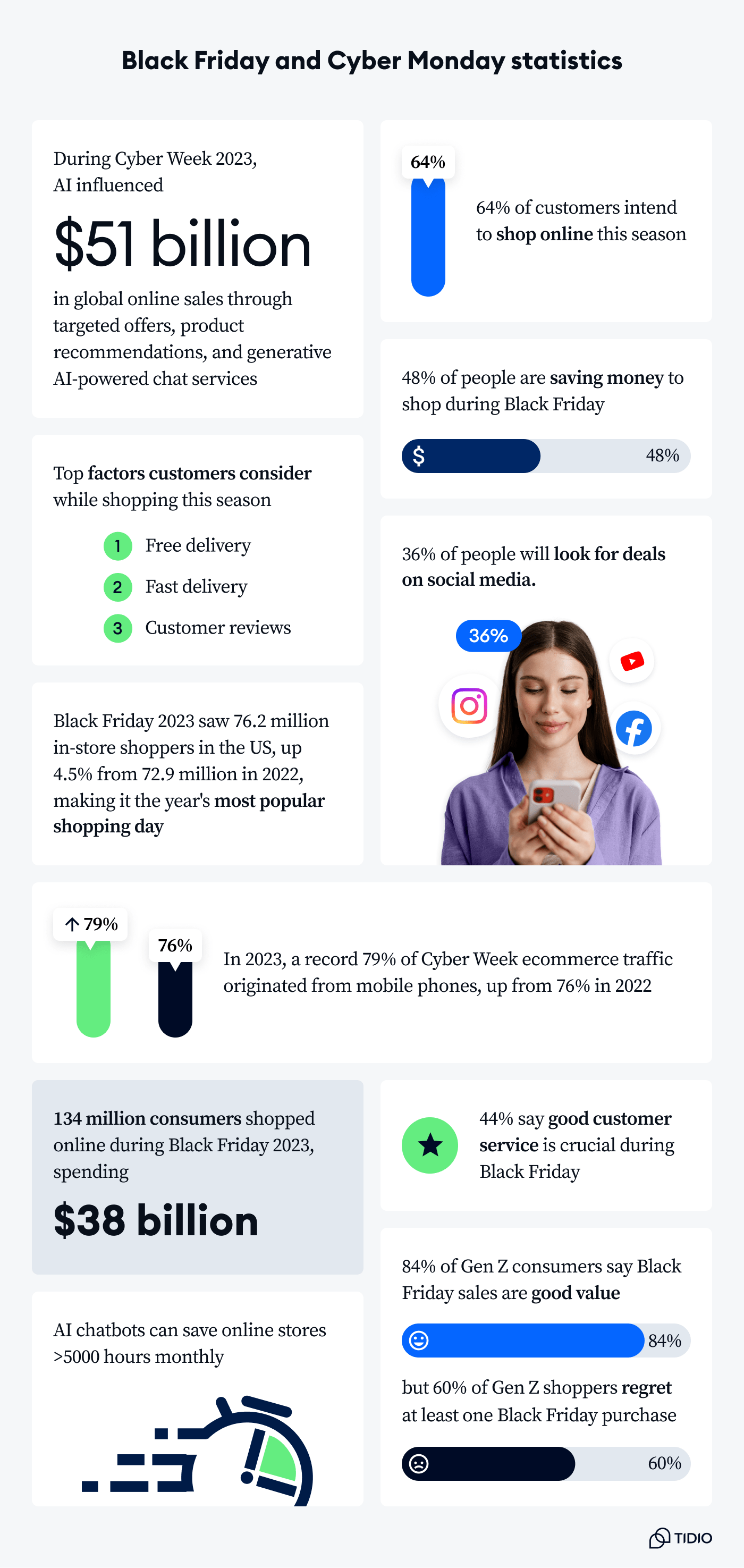
It seems that people can’t wait for the sales this year. So, if you’re a business owner, then you probably want to prepare for Black Friday and Cyber Monday in the best way possible.
Check the findings of our recent study to know what to expect during the 2024 Thanksgiving weekend sales:
- Over 87% of people take part in shopping during the Black Friday and Cyber Monday events
- Throughout Cyber Week 2023, artificial intelligence played a crucial role in driving $51 billion in global online sales by delivering personalized promotions, recommending products, and providing chat services powered by generative AI
- Over 90 million people in the US alone shopped online on Black Friday 2023, and 64% of customers intend to shop online in 2024
- In 2023, a record 79% of Cyber Week ecommerce traffic originated from mobile phones
- Over 45% of people shop for things they’ve been wanting to get for a while, and 48% of people are saving money to shop during Black Friday
- Black Friday 2023 saw 76.2 million in-store shoppers in the US, up 4.5% from 72.9 million in 2022, making it the year’s most popular shopping day
- About 84% of Gen Z consumers say Black Friday sales are good value, but 60% of Gen Z shoppers regret at least one Black Friday purchase
- Over 44% say good customer service is crucial during Black Friday
- A third of people start their holiday shopping on Black Friday, and another third on Cyber Monday
- More than 57% of consumers think Black Friday is just a scam to get people to spend more money than they normally would
- About 77% of people would want to book an appointment to shop in-store to avoid Black Friday crowds
- About 82% are ready to queue for more than 30 minutes to grab deals
- AI chatbots can save online stores more than 5 thousand hours per month
Now—
let’s look at how many shoppers spend during this holiday shopping season.
How much do people spend on Black Friday and Cyber Monday
It seems like nothing can stop people from spending during the long-awaited Black Friday season. In 2023, more than 200 million people made at least one purchase. Of them, more than 134 million shopped online, spending $38 billion over the 5-day period. This marked a 7.8% increase from the previous year.
Interestingly, the biggest shopping day in 2023 was Cyber Monday. People spent more than $12 billion online, an almost 10% YoY increase. It seems like shoppers are willing to wait until the very last moment to buy their products (and do it online).
What’s the average amount spent on Black Friday?
According to research, shoppers spent on average $321 during Cyber Five 2023, which is consistent with the average of $325 the previous year. In 2022 approximately 4 in 10 holiday buyers were willing to go into debt on their credit cards because of holiday shopping.
The 2023 season was met with more money-consciousness: about 53% were worried about overspending and incurring credit card debt during the sales season. The concern was slightly more widespread among Gen Z and Gen X buyers and stood at 58%.
Still, each year the sales numbers are huge, and 2024 will continue this trend. The Black Friday sales market is projected to reach approximately $278.645 billion in 2024.
During November, online stores that use AI chatbots can save more than 5 thousand hours of their work
Sounds like magic? Our data shows that online stores that use AI-powered virtual assistants save more than 5 thousand hours of work dedicated to customer support, which equals about 213 days or ⅙ of a year.
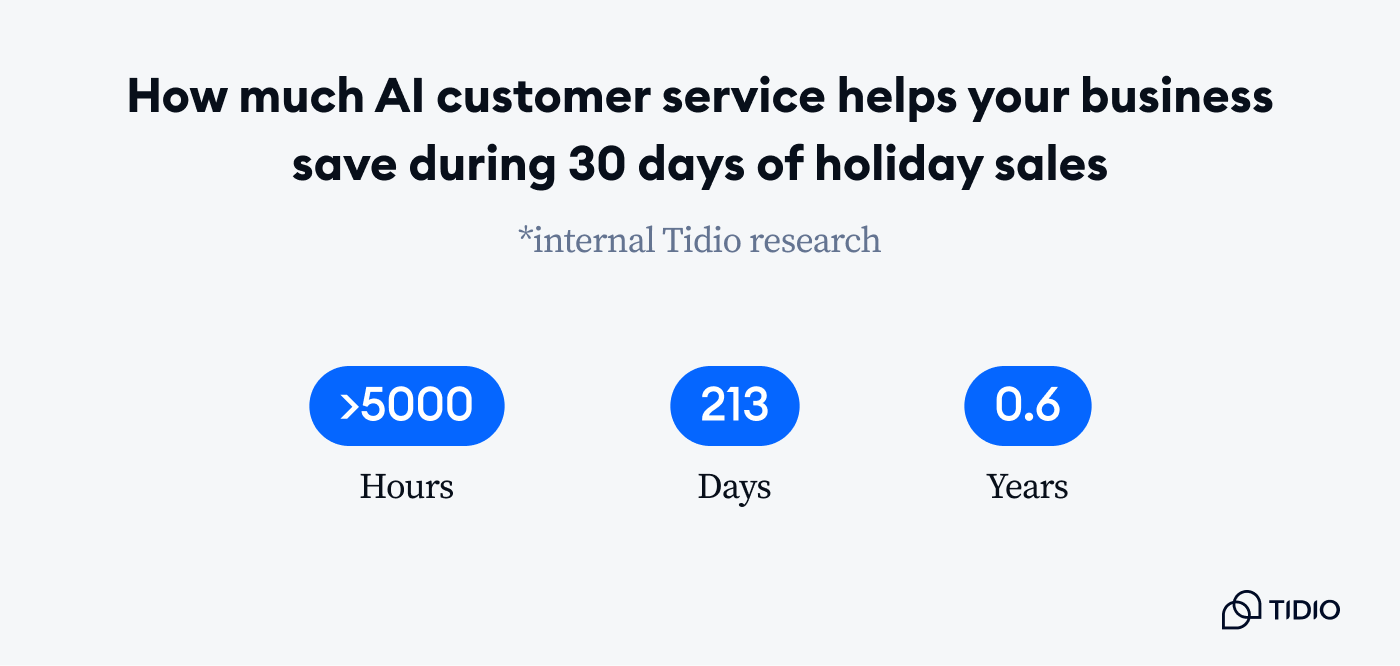
Read more: Check out our dedicated report on chatbot statistics and trends.
You might wonder how this is even possible. For example, Tidio’s AI chatbot Lyro can automate up to 58% of customer requests. During the busy Black Friday season, such tools become irreplaceable. They save time and money and help skyrocket customer satisfaction. Clients receive great customer service and return for more shopping even after the holiday season is over. It’s a win-win!
Elevate your BFCM Customer Service with AI
Over 87% of people take part in shopping during the Black Friday and Cyber Monday events
In numbers, how many people shop on Black Friday?
A study shows that in the US alone, over 74% of the population planned to shop on Black Friday in 2023. This year the numbers are bound to grow.
On top of that, our Black Friday stats show that 48% of shoppers save money for the event, an almost 10% increase from 2023.
And what will they be buying?
Well—
Around 32% of the customers will do Christmas shopping, about 45% will buy products they’ve been wanting for a while, and 23% of shoppers just want to spontaneously hunt for good deals.
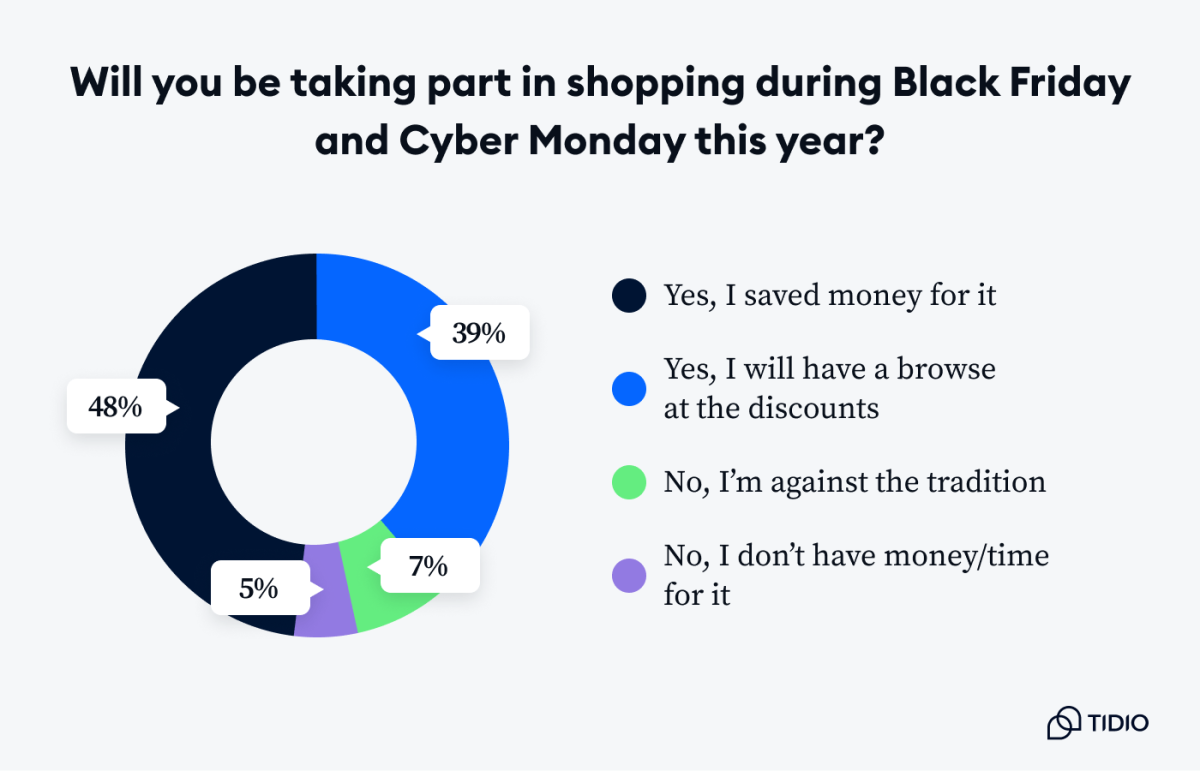
Another highly anticipated question for businesses is: are people going to prioritize online or in-store shopping during the holiday season?
Over 90 million people in the US alone shopped online on Black Friday 2023
Black Friday was clearly the most popular day for online shopping in the US. The number of consumers going on the internet to make purchases online grew by almost 4% compared to 2022 when it stood at 87 million.
On top of that, less than a third of all US consumers planned to shop in physical stores in 2023, which is understandable: why queue and waste your precious time when you can have a fast and efficient shopping spree online? In fact, almost 45% of our respondents don’t like that there are too many people in shops on Black Friday. So, online shopping and ecommerce sales seem like a perfect solution.
The trend will continue in 2024. As many as 64% of consumers globally plan to shop online on Black Friday. This is a nearly 10% increase from 2022, when about 55% of shoppers had the same plan.
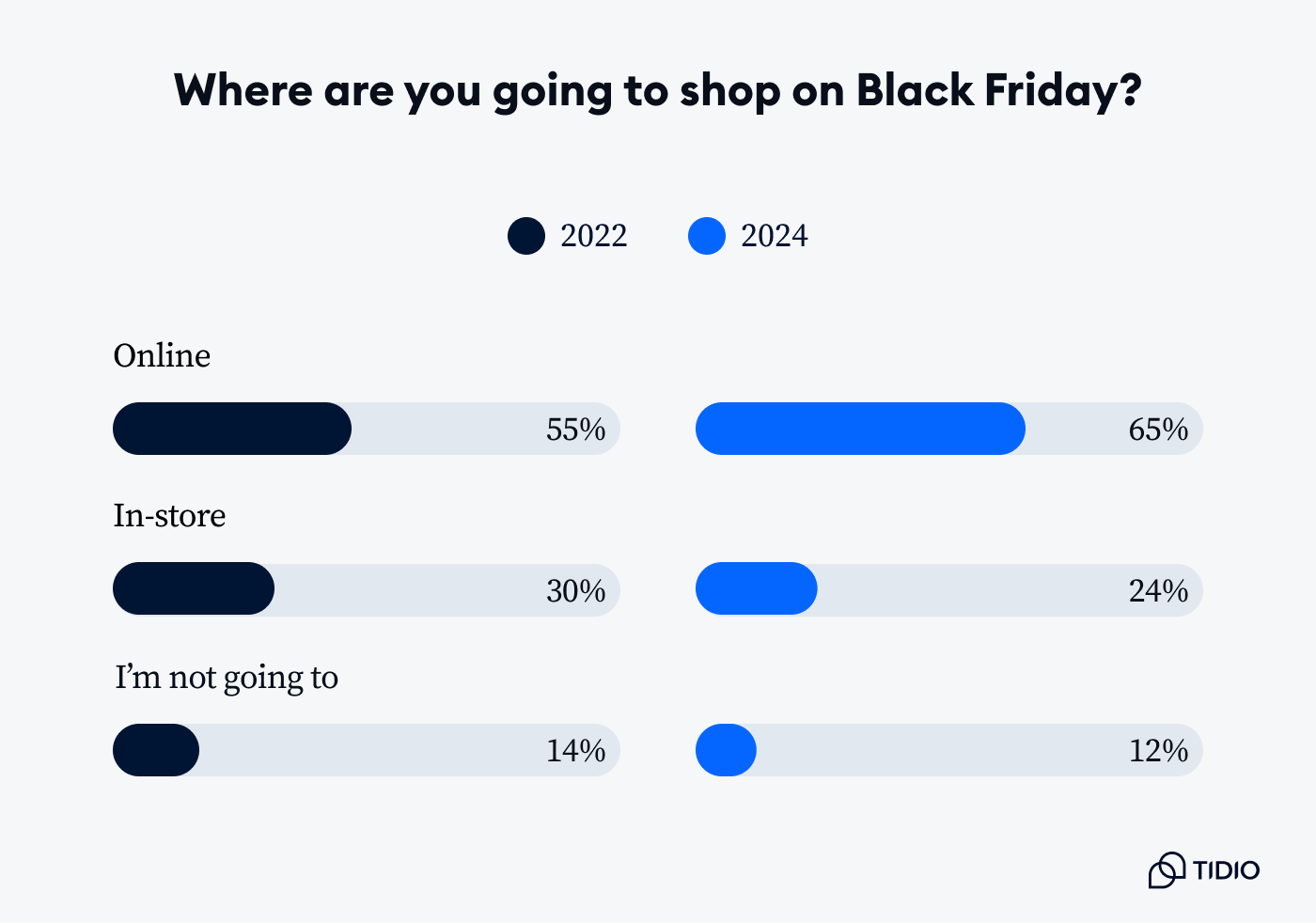
Moreover, about 48% of online shoppers will look for deals on social media. Around 13% of buyers will look for sales on Google, which is a drastic decrease from 25% in 2023. The good news for ecommerce and small business is that almost 19% will look for deals directly on a company’s website.
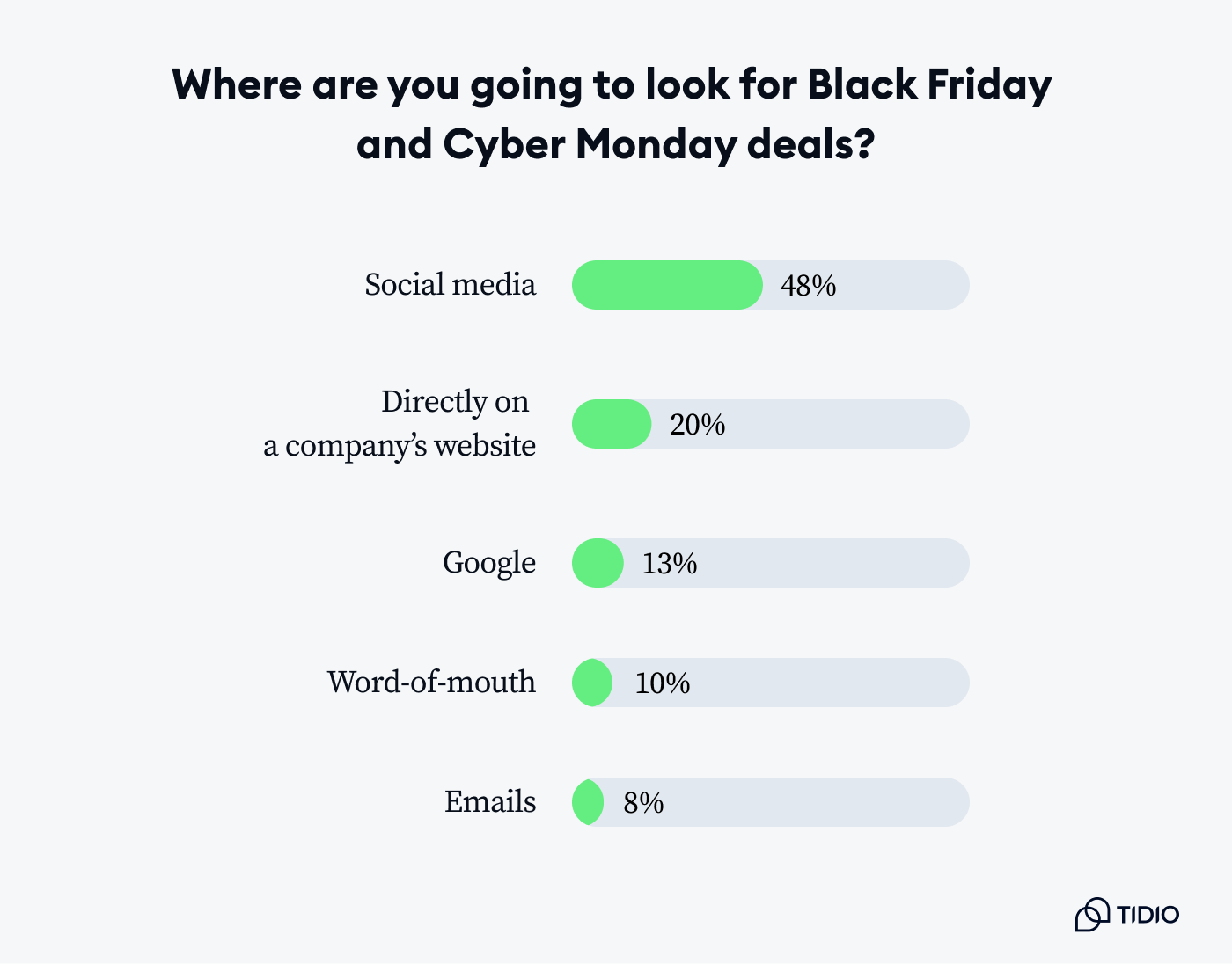
Interestingly, BOPIS (buy online, pick up in-store) slightly fell in popularity in 2023. The option was used in about 18% of all orders. In 2022, it was 21%. BNPL (buy now, pay later) seemed to peak in November like never before: it generated $9 billion in revenue, a 17% YoY increase.
What about people who refuse to shop on Black Friday?
The number of consumers who declare that they are not taking part in the BFCM extravaganza this year is about 12%, a decrease from 2023, when the number was about 14%. The reasons for people skipping the event vary: lack of time, not having enough money to spend, and having to work on that day.
AI influenced $51 billion in global online sales during Cyber Week 2023
This is huge, and it’s only the Cyber Week. As much as 17% of all holiday orders in 2023 were influenced by AI, amounting to $199 billion. In 2024, when AI has found its way to most business operations, the numbers will be even higher. In fact, almost 50% of our respondents agree that AI will have a great influence on this year’s sales.
The positive impact of AI on Black Friday sales is clear. The integration of AI has enabled retailers to craft highly personalized experiences for consumers, from targeted promotions that align with individual preferences to tailored product recommendations that increase the likelihood of purchase.
Additionally, AI chatbots have enhanced customer support, providing instant, accurate responses that improve satisfaction and drive sales.
If you haven’t already, it’s high time to introduce AI to your business operations before the holiday season commences. It will save you time, earn money, and win you plenty of happy customers who will return to purchase more even after the sales season ends.
Elevate your BFCM Customer Service with AI
In 2023, a record 79% of Cyber Week ecommerce traffic originated from mobile phones
This is an increase from 76% in 2022, and great news for businesses who prioritize mobile optimization of their website. Mobile commerce keeps growing, and on Black Friday, it gets absolutely huge. Across the whole holiday season in 2023, more than 50% of all online sales came from mobile devices. In addition, sessions on ecommerce apps during Black Friday grew 20% year-over-year.
In 2024, almost 32% of customers plan to do their online shopping from their mobile phone or tablet, and 33% plan to do so on desktop. What does it mean for businesses? It means that this opportunity simply cannot be wasted. You should optimize your store for online shopping, pay attention to mobile commerce, and try to offer impeccable customer service since almost half of the respondents say it’s crucial during the sales season (and, frankly, always).
Read more: Check out our dedicated report on mobile commerce statistics.
Keep in mind that consumers find shopping via an app on their mobile device (42%) more appealing than filtering products on a website, even if it has a mobile version (37%). This could mean that people want to use Amazon, AliExpress, and Wish apps instead of going to more niche ecommerce sites that don’t have their own apps.
So, if you have a startup ecommerce business on Shopify, but no app, how can you get more sales during this Cyber Monday week?
Online retailers can use AI to help Black Friday shoppers find the best deals. It’s worth noting that more customers want instant recommendations from a chatbot than via an email newsletter.
It’s a win-win situation with buyers finding the right products and online stores increasing their conversion rates.
By the way, what products do end up in the shoppers’ baskets?
Over 45% of people shop for things they’ve been wanting to get for a while
Black Friday data shows that retail sales are still the top product category during this shopping event. Clothing, shoes, jewelry, and beauty products, as well as electronics are the trending Black Friday deals. So retailers who sell these items should restock on their bestsellers and prepare the fast delivery processes.
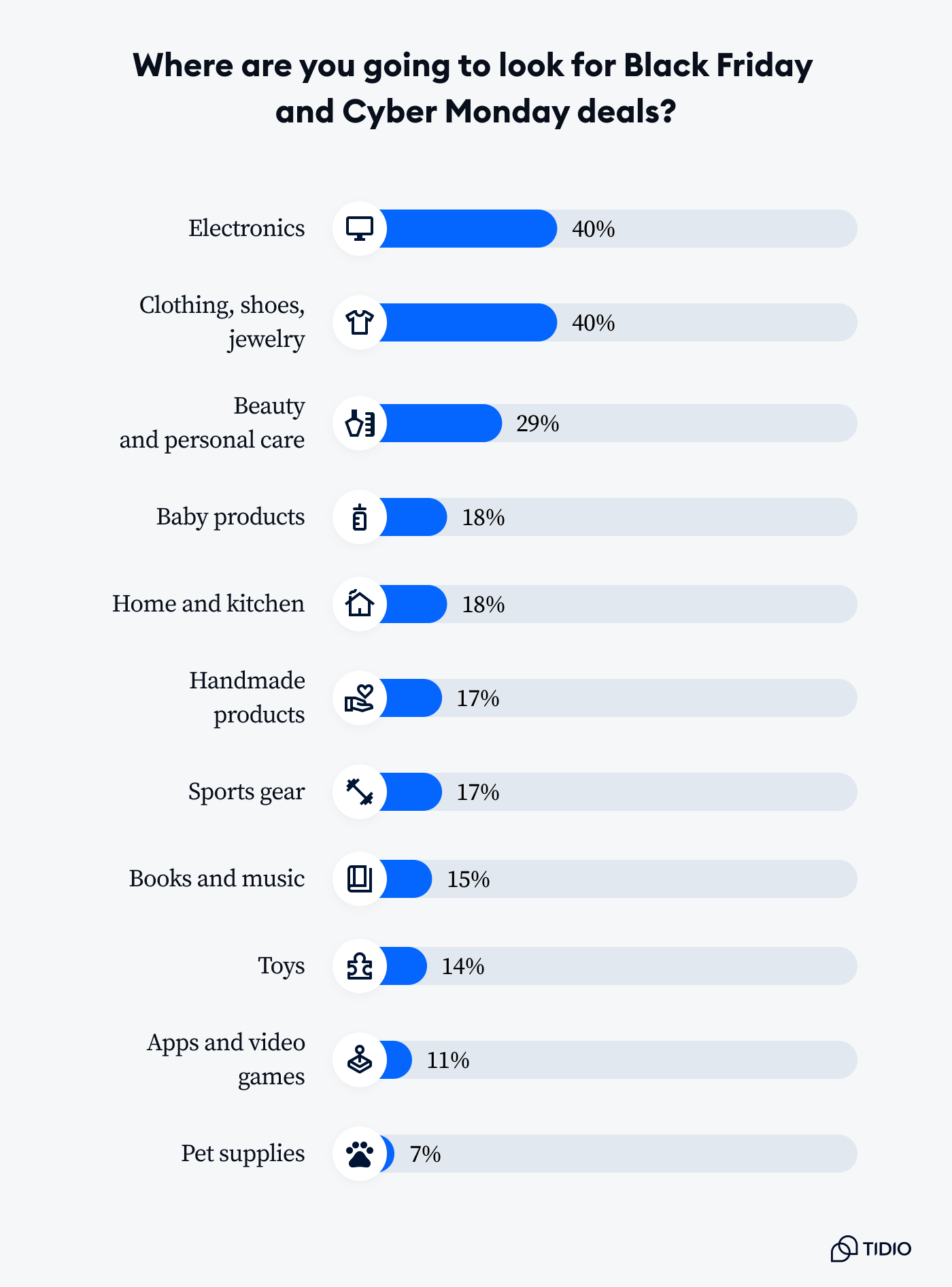
In comparison with previous year, Black Friday shopping stats show that fewer people are interested in buying electronics, such as smartphones, AirPods, and TVs. In 2023, electronics was the biggest category, driving 55% of real web traffic across the holiday season. In 2024, more of us are after beauty and personal care items. Let’s treat ourselves to a home spa day, why don’t we?
When creating your marketing strategy, keep in mind that price isn’t the biggest consideration anymore when it comes to shopping during BF & CM.
Delivery takes the two podium spots. About 31% of people look for free delivery, 25% search for products with fast delivery, and 24% check customer reviews before purchasing an item.

So, how much should Black Friday discounts be?
Firstly, it’s worth noting that shoppers prefer to buy items on the day of Black Friday & Cyber Monday events instead of getting a discount to use whenever they like.
In fact, 62% of people prefer a 30% discount code valid only on Black Friday instead of a 15% discount on a gift card to use anytime. Remember that when preparing your Black Friday offers and discount codes.
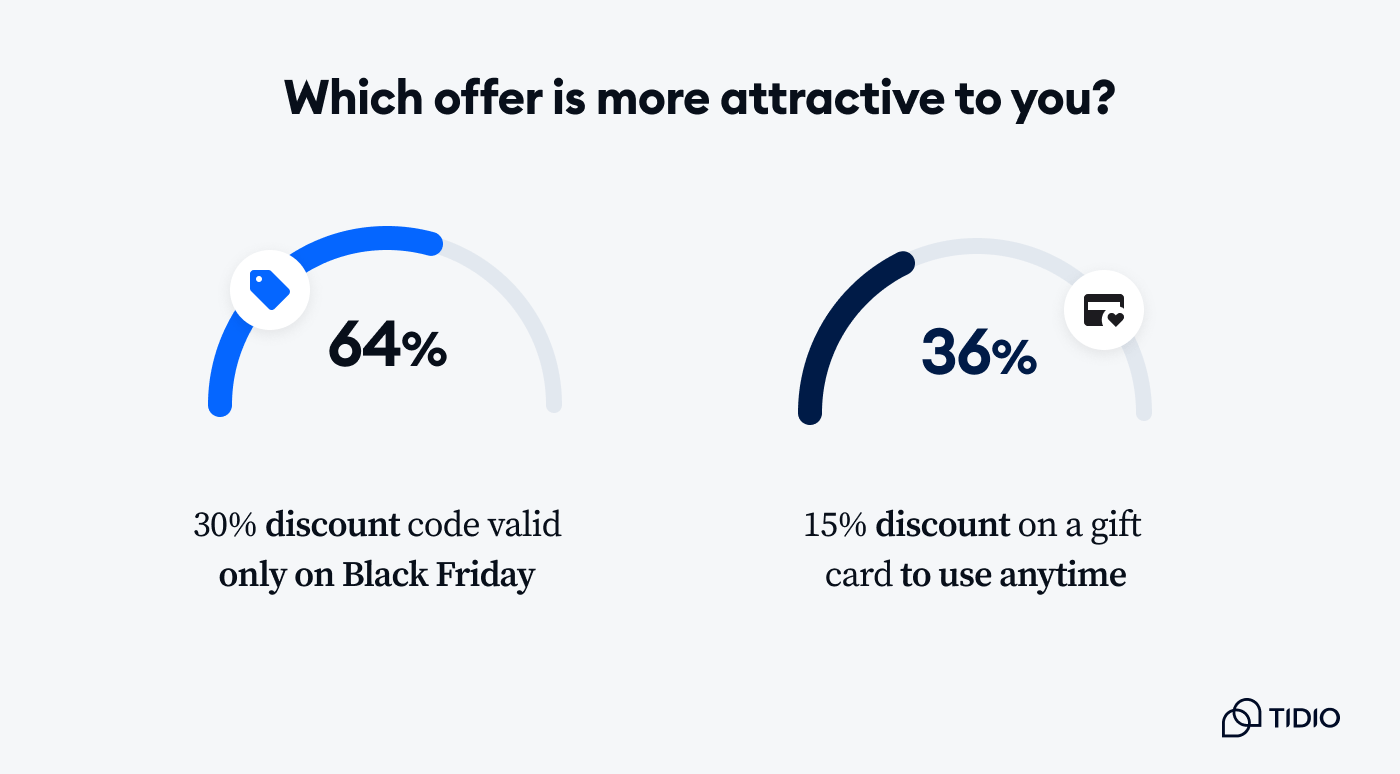
A third of people start their holiday shopping on Black Friday, and another third on Cyber Monday
This is yet another proof of how big of an influx of shoppers businesses should expect, especially online. In 2023, web traffic on Black Friday was practically double the average October day, with about 67 million sessions.
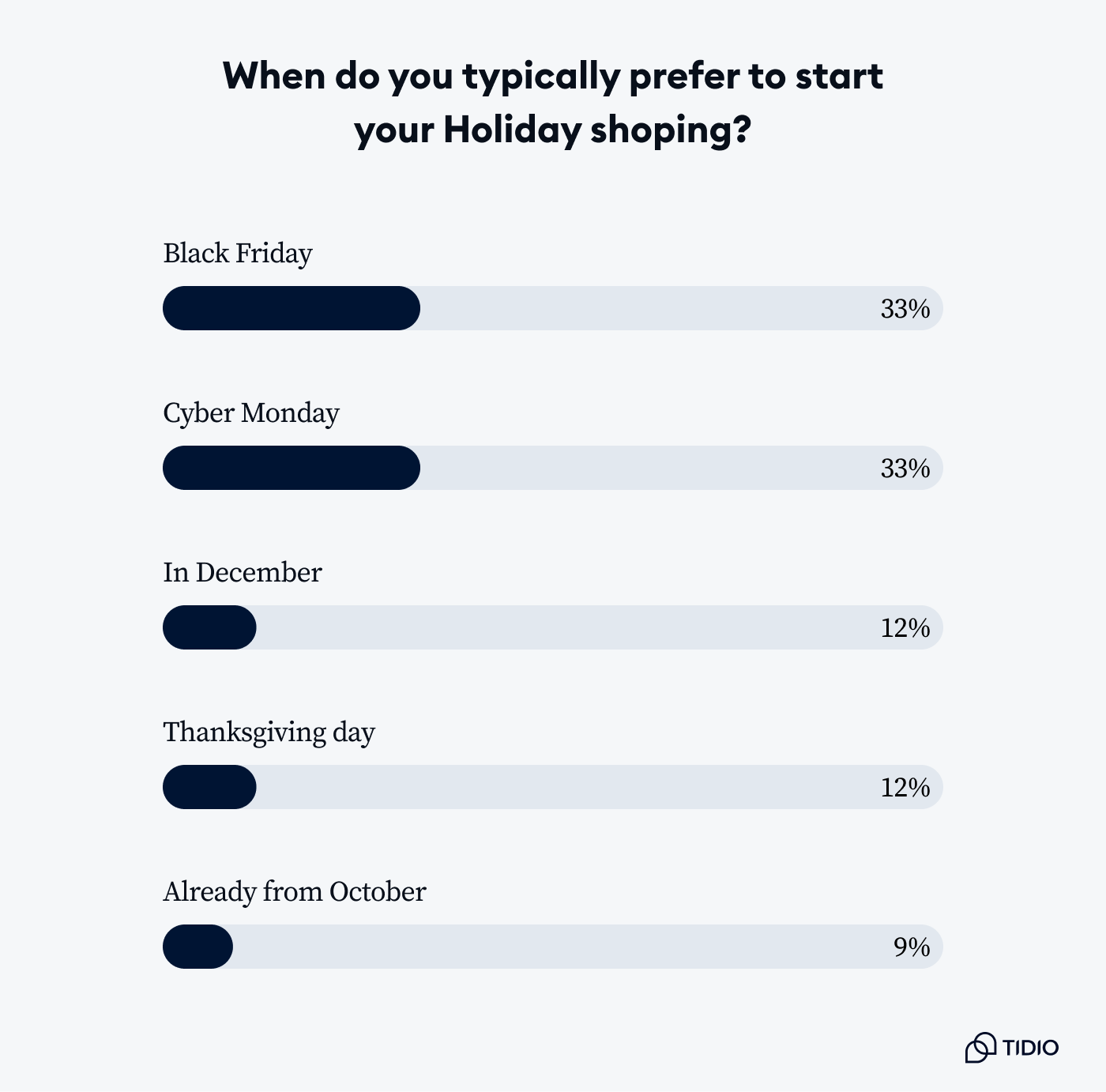
While it’s a great idea for businesses to be prepared to manage large volumes of orders all year round, the Cyber Five season and Black Friday in particular is something different.
The craze starts way in advance, as almost 15% of clients complete most of their Black Friday shopping on Thanksgiving evening. About 21% do a night shopping session and make their purchases from 12 a.m. until 6 a.m. on Black Friday morning.
Around 27% prefer regular shopping hours—this is also when in-store shopping peaks, specifically between 2 and 4 p.m. Finally, 18% go shopping late in the evening on Black Friday, and another 20% make their purchases throughout the weekend after the event.
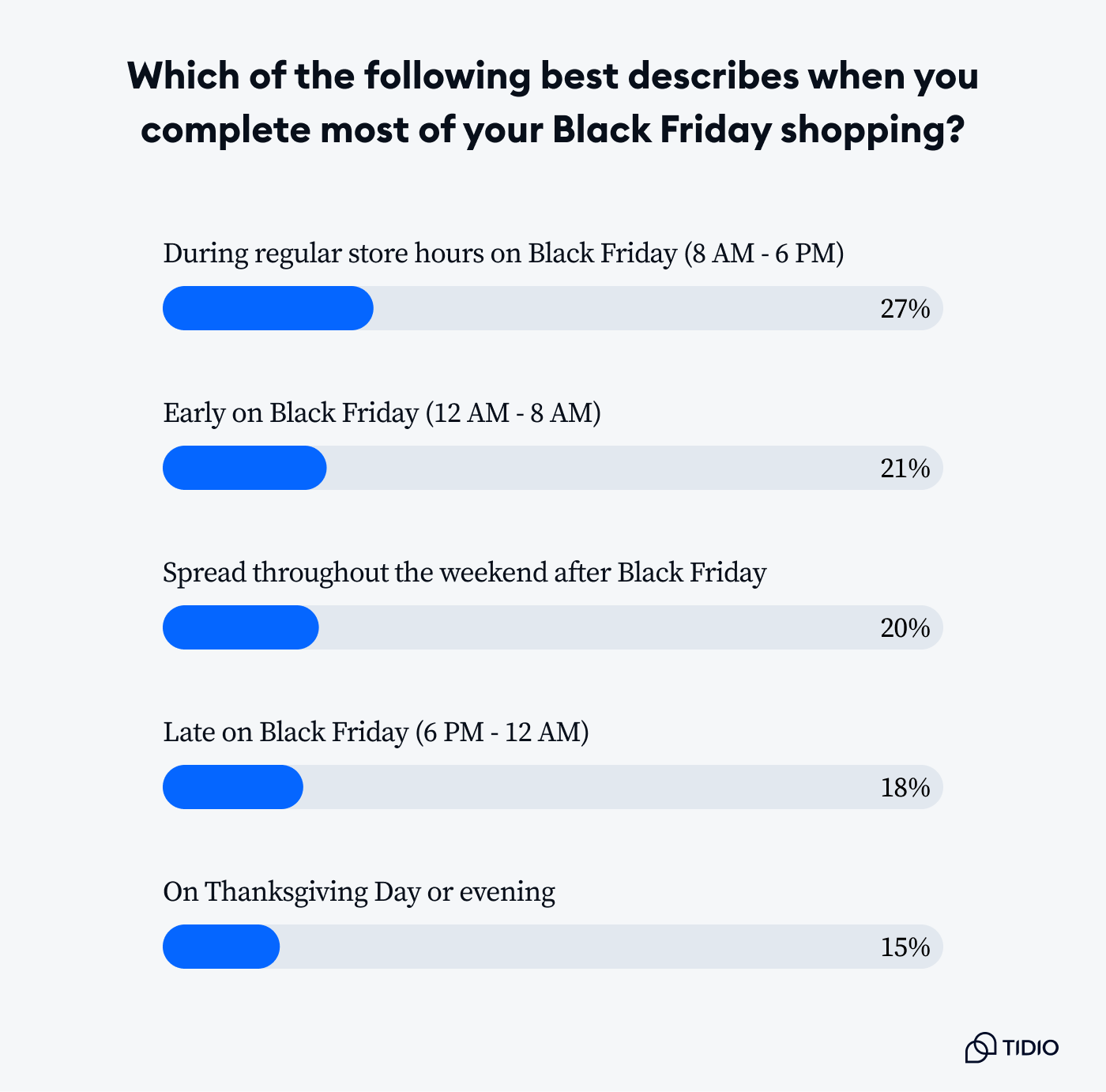
Speaking about Cyber Monday, people seem to really enjoy browsing for online deals on that day. In fact, only 11% spend less than 1 hour shopping online. It means that people are dedicated to comparing deals, making informed decisions, and talking to virtual shopping assistants when needed.
And about 13% dedicate more than 6 hours to shopping—they are ready to spend plenty of time and money, so it’s extremely important not to lose such customers.
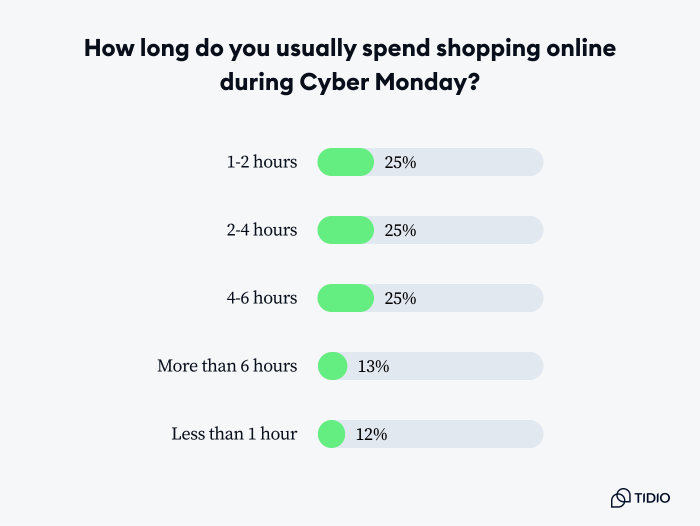
While most people do buy things, the attitudes to Black Friday vary. Are there any demographic differences in how much people like Black Friday and how much they spend? Let’s find out.
Customer attitudes towards Black Friday & Cyber Monday
There’s no denying that people storming Target and Walmart on the 29th of November are fans of Black Friday sales, and it’s not their first time hunting for deals. Sales of Apple products, video games, and even sporting goods are hot for everyone from Gen Z to Baby Boomers.
But, what are people’s attitudes toward the event? Are they after the deals or the chaotic experience of the tradition?
About 84% of Gen Z shoppers consider Black Friday deals to be good value
Still, as many as 60% of Gen Z customers regret Black Friday purchases. This is quite predictable: discount seasons and flashing “Sale!” and “Buy now!” signs might make us buy something we don’t necessarily need and regret it later. The average amount spent on these items equals approximately $233.
On the other end of the spectrum, the least regretful of their Black Friday shopping spree are Baby Boomers, only 40% of whom are not happy with how they spend during the holiday season.
As for gender differences in attitudes, about 73% of men believe Black Friday deals are a great value for money, compared to 67% of women. Women are generally more cautious when it comes to Black Friday consumer spending: 23% of them believe that retailers artificially raise their prices before the holidays, only to lower them again on the actual Black Friday or Cyber Monday day.
Most consumers think Black Friday is just a scam to get people to spend more money than they normally would
In fact, only 10% of people disagree that Black Friday is a scam. And about 46% of consumers like the sales but not the tradition.
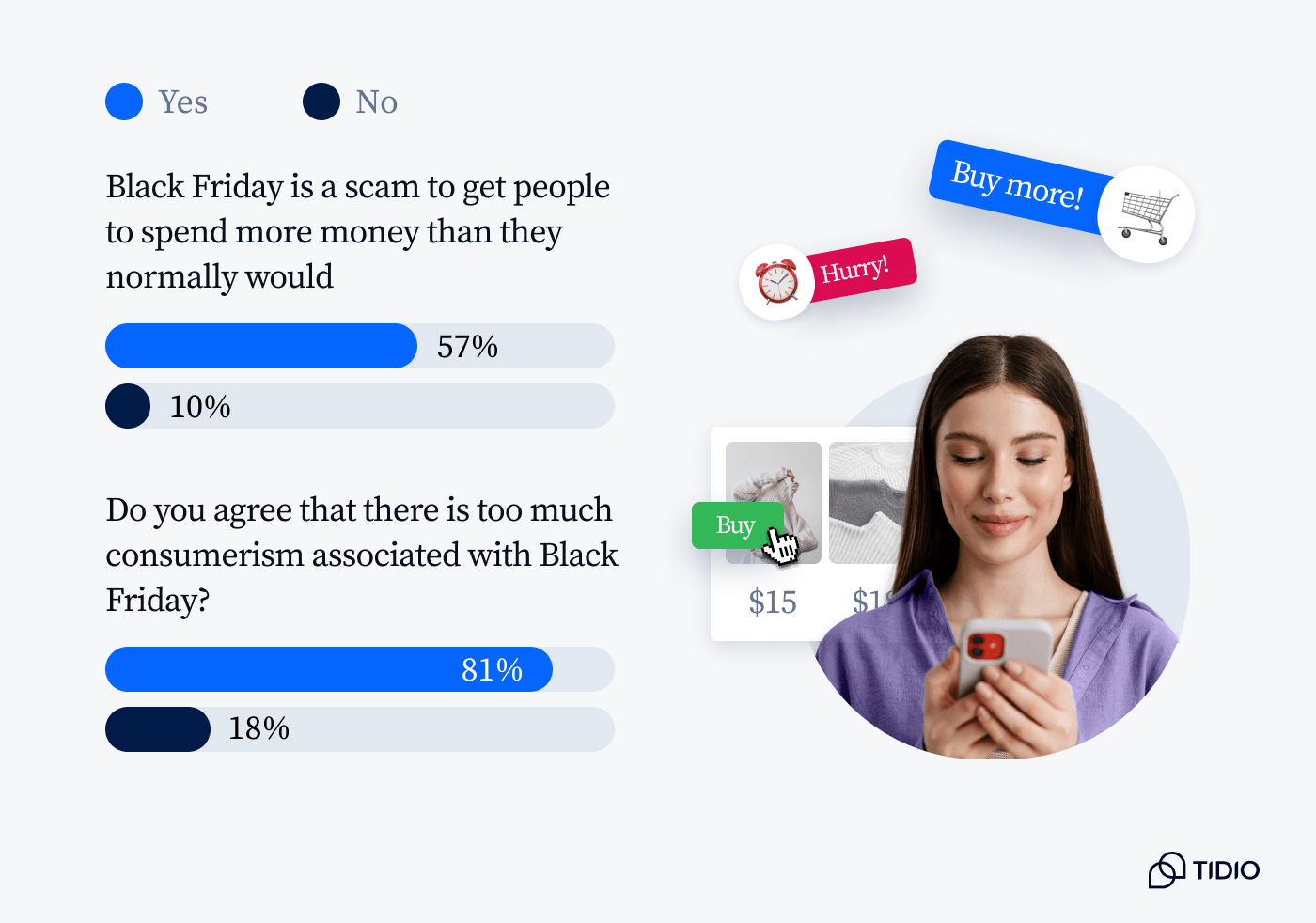
In addition to that, over 80% of shoppers say there’s too much consumerism associated with Black Friday and Cyber Monday events.
Also, about 76% of buyers state that companies spam us with too many BF ads. They say that brands start to advertise too early and the ads get annoying fast. On the other hand, 23% of US consumers think that it’s convenient to receive discounts and information about sales in advance.
Too many BFCM ads is definitely the thing that annoys many people. Predictably, another pain point is huge crowds.
It brings us to the next interesting statistic—
Most people (77%) would be interested in booking an appointment to shop in order to avoid crowds
Nearly 8 in 10 shoppers would book an appointment online to shop in-store and avoid crowds. One comment from the participants in our study brings up an interesting point—booking an appointment to shop could help disabled people. Maybe you could consider this when preparing your store for the event this year.
Keep in mind that most shops won’t put this booking system in place for this year’s event. Another way to avoid crowds as much as possible is to go shopping outside of the peak hours.
The peak times for store shopping in the US are between 2 pm and 4 pm. So, if you want to avoid the big foot traffic but still enjoy the in-person shopping experience, then you should visit the mall early this year or shop online.
A whopping 82% of buyers are willing to spend over 30 minutes in lines during the Black Friday event
Around 16% of Gen Z wouldn’t spend longer than 10 minutes in a queue. This number falls to only about 6% when it comes to people over the age of 40.
On the opposite side, Millennials are the most patient group of people when it comes to queuing—over 47% of them would spend over 50 minutes standing in a line during a Black Friday event.
And queues might be even longer this year.
According to more than 57% of our recipients, people will be buying more this year. Some might say it contradicts the fact that we are living through a cost-of-living crisis.
However, it actually makes a lot of sense: grabbing good deals and discounts, buying in bulk, and saving money to spend it on the things that people have wanted seems like a valid Black Friday craze explanation. On top of that, about 38% of people are ready to spend more than they did last year during Black Friday.
Our study also found that almost 40% of people are angry when they miss the Black Friday sales. In a recent study published in Motivations and Emotions, researchers linked the fear of missing out (FOMO) to the use of social media. Essentially, FOMO in the Black Friday context means that people choose to interact with businesses because they think they will miss out on something valuable.
Elevate your BFCM Customer Service with AI
Cyber Monday and Black Friday trends: key findings
Black Friday definitely continues to be the biggest shopping day of the year in the United States. Many factors, such as inflation, rising cost of living have a considerable influence on buyers’ behaviors and holiday sales.
Black Friday facts and statistics show that most of the customers are moving towards online spending, and mobile commerce is becoming huge. Consumers also feel they can get the best discounts online. And companies can improve their experience by developing a shopping app or a chatbot to recommend the best deals.
While a large portion of customers believe BFCM deals are designed to trick people into buying more, most customers want to take advantage of seasonal sales. They tend to put aside money for this particular occasion and usually buy products they had planned.
Prepare your store for big crowds and ensure fast delivery of your products, as well as aim for stellar customer service. Make sure you have an online presence and advertise your deals on social media for the best result from this season’s marketing campaigns. This way you can get the most out of the Black Friday and Cyber Monday events.
Methodology
For this study about BFCM shopping habits and predictions, conducted the internal research using Amazon Mechanical Turk. We then compared the data to our internal research conducted in 2022 and 2023.
Our respondents were 70% male and 30% female. Most of the participants (79%) are Millennials aged between 25 and 41. Other aged groups represented are Gen X (12%), Gen Z (7%), and Baby boomers (1%).
Respondents had to answer 14 questions, most of which were multiple-choice or scale-based ones. The survey had an attention check question.
Furthermore, we evaluated the performance of our in-house AI assistant, Lyro, in managing the demands of the peak holiday season among our clients.
For the purpose of the study, we’ve also used external sources to collect data regarding Black Friday 2023 statistics. The sources used are presented below.
Sources:
- 148 Million Americans Plan to Shop Super Saturday
- NRF Says 2022 Holiday Sales Grew 5.3% to $936.3 Billion
- US Holiday 2022 Review and Holiday 2023 Preview
- Salesforce Data Reveals Record-Breaking Cyber Week: $298B in Global Digital Sales, $51B in AI-Influenced Purchases
- NRF Says Census Data Shows 2023 Holiday Sales Grew 3.8% to Record $964.4 Billion
- Thanksgiving Holiday Weekend Sees Record Number of Shoppers
- Consumers who plan to shop on Black Friday and Cyber Monday in the United States as of October 2023
- CSA Exclusive: Black Friday helps drive Cyber 5 mobile ‘halo effect’
- Black Friday statistics 2023
- Cyber Week Won the 2023 Holiday Season – Driven by AI and Value Shoppers
- Holiday shopping statistics 2023: Data from 2.4 billion retail web visits
- Accenture’s 14th Annual Holiday Shopping Survey
- NRF’s Annual Thanksgiving Weekend Consumer Survey, conducted by Prosper Insights & Analytics
- 127 Black Friday statistics every retailer needs to know in 2024
- Fear of missing out: prevalence, dynamics, and consequences of experiencing FOMO
- The psychology of Black Friday: The thrill of the hunt, the comfort of ritual
- US Holiday 2021 Review and Holiday 2022 Preview
- Thanksgiving Weekend to See More Holiday Shoppers Than Last Year – And Consumers Already Have a Head Start
- Deloitte: Consumer Sentiment Improves as the Excitement of Black Friday Returns
- Holiday Debt Survey
- What Store Traffic Data Reveals About Black Friday Shopping
- Adobe Analytics: Boom! This season’s shopping trends are in.
- Survey: 50% of holiday shoppers will begin before Halloween, 54% report feeling financially burdened
- Global Online Sales Top $1.14T During 2022 Holiday Season, Salesforce Data Reveals

